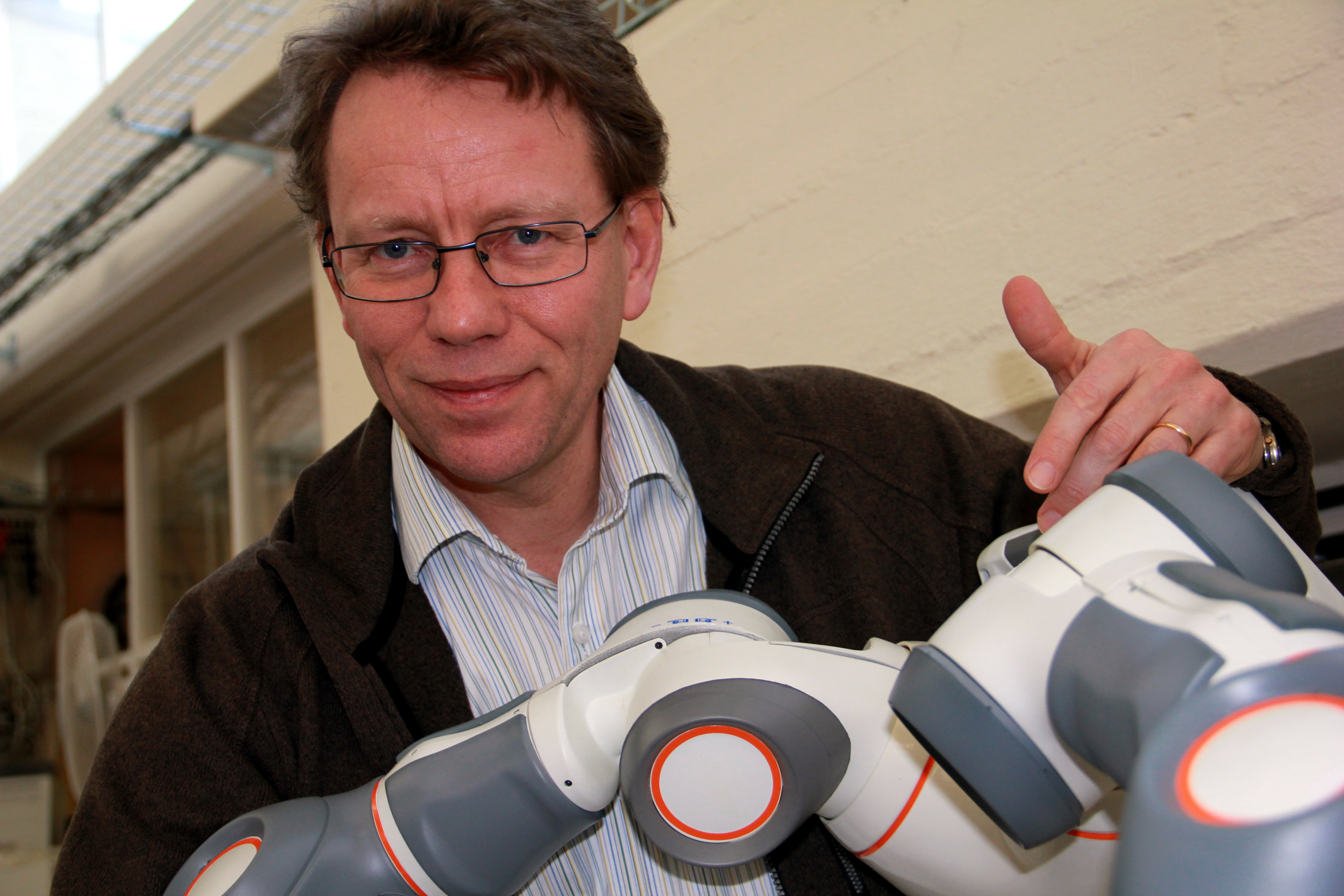Teachable robot gets ready for factory toil
– Published 2 March 2012

If robots are to take over people’s jobs then they must become, well, more human! When it comes to learning from previous experience, fine motor skills and manual dexterity, today’s robots are far behind humans. However, researchers at the Faculty of Engineering (LTH) are now working to give robots these characteristics.
“Today’s industrial robots still lack one typical human ability, namely to learn from previous experience”, says Klas Nilsson, a reader in Computer Science.
He mentions another human ability that means robots come off badly in comparison to people: fine motor skills and manual dexterity.
“By giving robots a sense of touch and improved movement, and linking these to the ability to learn, the robots can suddenly adapt to a new material or assemble a component that has been placed slightly out of line – which today’s robots cannot do.”
The technology is not on the market yet and is not even available to buy, but in a few years Klas Nilsson and his colleagues hope to be able to demonstrate the technology to build a teachable and deft robot. The technology is suited to several different types of robot, but particularly to ABB’s two-armed concept robot Frida, the Friendly Robot for Industrial Dual-Arm Assembly.
“It is a two-armed robot that can work with humans in a flexible manner. With our new sensors and control software it could take over many of the assembly jobs currently performed by people”, says Klas Nilsson.
The often appalling working conditions for factory workers were highlighted in the media a couple of years ago when several employees of the Chinese electronics manufacturer Foxconn, which supplies parts to companies including Apple, Hewlett-Packard, Dell and Sony, committed suicide as a result of the inhumane working conditions.
Not only telephones and computers, but also most hand tools and cars, are still assembled worldwide by humans.
“Most people know that modern cars are welded by robots, but even they are still mostly assembled by hand”, says Klas Nilsson.
The problem is that industrial robots must be entirely reprogrammed if something changes, which is both expensive and time-consuming. Klas Nilsson gives the example of the incident that made Ericsson give up robotic assembly and move its production to China.
“Until almost ten years ago, most of Sony Ericsson’s production was based in Kumla in Sweden, but traditional robotics turned out to be just too inflexible. If, for example, the plastic cover of a mobile phone came from a different supplier, there might be a small difference in rigidity. To put the cover in place required a little more force, which would have been no problem for manual assembly. But because the robot was not programmed to press any harder than necessary, it was not possible without expensive reprogramming requiring production to be stopped”, he says.
Since then, progress has been made in computer science, mathematics and automatic control engineering, which means that it is now possible to develop functioning solutions.
“It may sound a bit pretentious, but developing a teachable robot involves a new way of thinking. Something of a paradigm shift”, says Klas Nilsson.
Kristina Lindgärde
The research in brief
Researchers and industry are well on the way to developing an industrial robot that can learn from measureable mistakes and perform assembly despite the small errors and changes that usually occur on a production line. This means that many more robots could become factory workers in the future.
There has already been a lot of interest in this robot technology, but a few more years of research and development are needed before a deft, teachable robot can be launched on the market.
The project involves researchers from LTH in computer science, automatic control and mathematics, as well as researchers from Leuven in Belgium, Milan in Italy and Munich and Stuttgart in Germany. A few companies are also involved, in particular ABB Corporate Research which is coordinating the project.
The project is funded by the EU and goes under the acronym of “Rosetta” – RObot control for Skilled ExecuTion of TAsks in natural interaction with humans.
The following Lund researchers work on the project: Automatic Control – Anders Blomdell, Rolf Johansson, Magnus Linderoth, Anders Nilsson, Anders Robertsson, Andreas Stolt; Computer Science – Jacek Malec, Klas Nilsson, Pierre Nugues, Elin Anna Topp, Mathias Haage; Mathematics – Håkan Ardö, Karl Åström.
Text: Kristina Lindgärde
